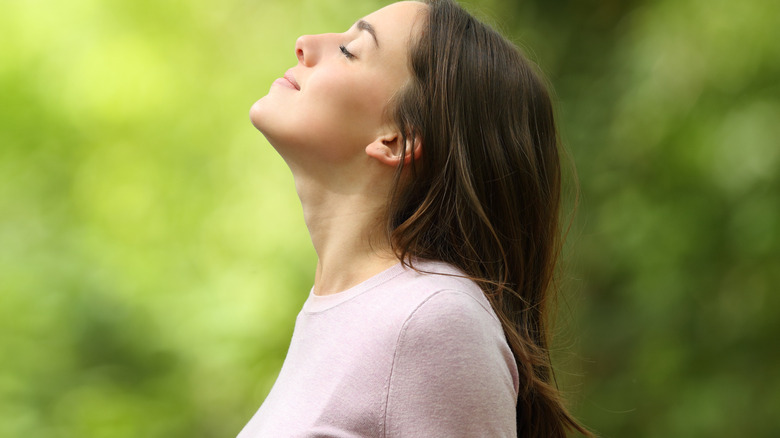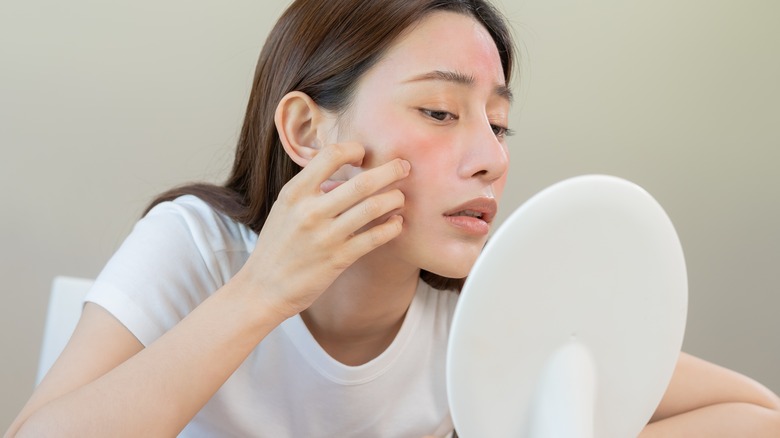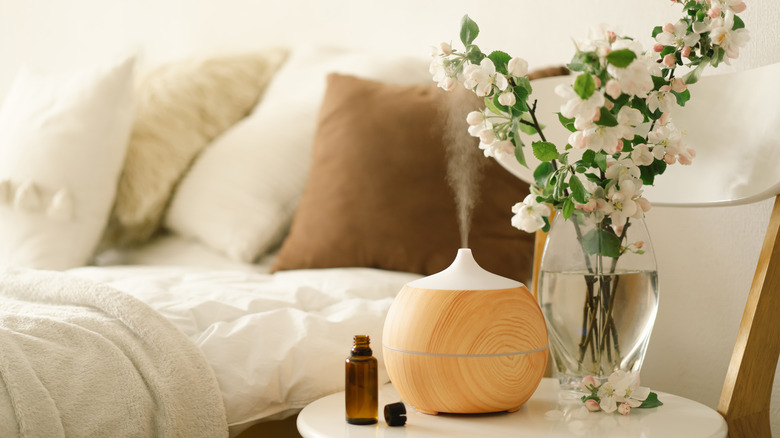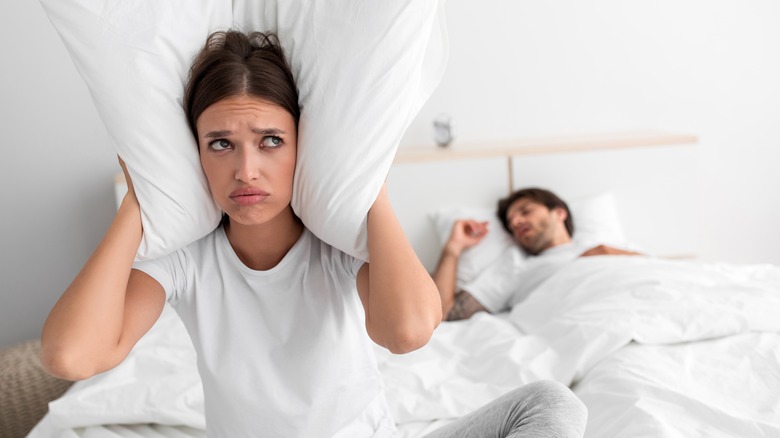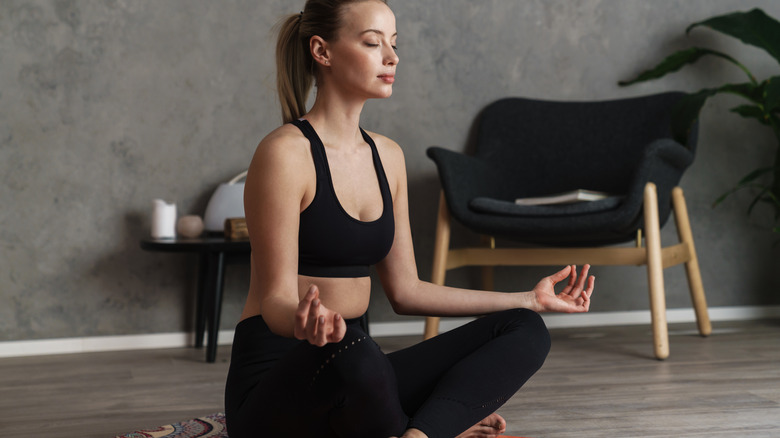Are You Breathing Out The Moisture In Your Skin?
Breathing is life. Literally. We're constantly breathing, but how often do you stop and think about how you are breathing? According to Healthline, there is a proper way to breathe where your breath should feel "smooth, steady, and controlled." When you are breathing normally, you should feel calm. When people get anxiety or panic attacks, they're further affected when they don't breathe in enough air, per Verywell Health. More anxiety means more stress, and it can become a vicious cycle. That is why breathing exercises are so helpful during those challenging times; they help relax you. Some simple breathing exercises can even reduce pandemic stress, so sign us up.
You also must have heard skin experts advise you to keep stress under control for better skin or the importance of letting your skin breathe. Do you notice an extra pimple on your forehead when you are more stressed out? Stress can affect your immunity and damage your skin (via MindBodyGreen). According to WebMD, stress is so powerful that it causes chemical imbalances in your skin. The results can show up as flared up eczema or acne, sensitivity, and irritation. If you are prone to stress, breathing exercises can help your mind and skin alike. Similarly, it can affect the moisture in your skin.
How breathing influences moisture loss
At first, how breathing can give you better skin might sound confusing, but there is a strong connection between stress and breathing — and stress and skin. According to MindBodyGreen, breathwork is not just a fad but has been practiced for years in ancient Ayurvedic and Chinese medicine for overall wellbeing. Therefore, how you breathe could support your skin's moisture level, making it look better or worse. Still, you can actually train yourself to breathe in a way that helps your skin's hydration levels. You can experience a "a net water loss of 42 percent" when you breathe only out of your mouth, for example, which can be amended if you breathe from your nose instead. After all, our mouth does not have the same filtration system as the hair follicles in the nose, per MindBodyGreen.
A study published in the National Library of Medicine showed people expelled more moisture when breathing with their mouth than their nose when connected to a mouthpiece versus a face mask covering their nose, respectively connected to a condenser. It proved that we lose more water breathing from our mouth than our nose, concluding that we do breathe out more moisture based on how we breathe.
Mouth breathing dehydrates your skin more
Well, you must be thinking, how does breathing from the nose or the mouth lead to more skin dehydration. However, the water you are losing is coming from somewhere in your body. Here's the thing: Our body's hydration level influences "the skin's moisture levels and dermal thickness," though more research is required to prove precisely how that works (via MindBodyGreen). However, some studies show that those who breathe with their mouth are more likely to have skin issues like eczema, and people with eczema are prone to having dry skin and transepidermal water loss.
Board-certified dermatologist Cynthia Bailey, M.D., told the outlet, "Transepidermal water loss (TEWL) impacts the integrity of the skin barrier and its function, contributing to inflammation, redness, and irritation." They added that mouth-breathing affects our gut's microbiome downstream, which ultimately influences skin health. Our skin rejuvenates and repairs itself at night, and mouth-breathing doesn't give you the best quality sleep, affecting how well your skin repairs itself during those hours.
It ultimately doesn't look like breathing from our mouth is helping our skin, with mouth-breathing actually being bad for your health. Furthermore, breathing from the mouth doesn't just dry your skin out but also gives you a dry mouth in the morning (via WebMD), which is definitely unpleasant.
The environment can affect your breathing and skin
Water is essential for survival. In fact, we need water for the proper functioning of our bodies. According to Healthline, water helps transport all the nutrients to all the organs, flush out toxins, and help sustain a healthy body temperature. Water is also necessary to make saliva and keep our skin hydrated. When our body is dehydrated, it influences the normal functioning of almost everything going on in our systems. It is essential to keep drinking plenty of water because, as nephrologist Steven Guest, M.D., told WebMD, "Fluid losses occur continuously, from skin evaporation, breathing, urine, and stool, and these losses must be replaced daily for good health."
You lose water in the form of sweat and breathing while working out, and it is vital to constantly rehydrate yourself. The Mayo Clinic shared that it is also easier to breathe in a humid environment than in dry ones because low humidity dries your skin and irritates your nasal passages, making you more prone to breathe with your mouth, leading to more moisture loss. Investing in a humidifier is an excellent idea for those in dry climates, as it will make it easier for you to breathe from your nose and reduce the chances of dry skin.
Reasons you shouldn't breathe from your mouth
Now that you know breathing from your mouth isn't doing your skin any good, there are other reasons why you should reconsider this habit if you are prone to it. According to WebMD, if you have the habit of breathing from your mouth, it is likely that you will also experience snoring, bad breath, and not get the best night's sleep, as you will wake up feeling more tired and not as alert. It's therefore definitely not the best way to breathe, but there are reasons people breathe from their mouth than the nose.
Healthline shared that the mouth is the go-to way to breathe when your nasal passages are congested. Other factors that make you do it can be anything from a deviated septum to enlarged tonsils or simply your jaw's shape and size. Ultimately, breathing from the mouth isn't doing us any good other than keeping us alive because the air we breathe in from the mouth is "not filtered, humidified or warmed to body temperature," giving us plenty of reasons why we should give the primary responsibility to our nose, per USA Today.
Dr. Ann Kearney of the Otolaryngology Department at Stanford University told the outlet, "We breathe through our nose at a slower rate, and its moisture and temperature control make for a better and more efficient system." Fortunately, we can train ourselves to breathe from our noses, but if you have severe breathing issues, you should seek professional help.
How to practice breathwork
There are advantages to breathing from your nose more than your mouth. As Patrick McKeown, an advisor of the International Academy of Breathing & Health, told USA Today, "the nose is [the] first line of immune defense" because our sinuses produce nitric oxide that is "antibacterial, anti-fungal, anti-pathogenic and antiviral," but our mouth doesn't.
Still, there are ways to achieve better breathing. Yoga helps with proper breathing from the nose, for instance. You might take up yoga to work out or improve your flexibility, but James Nester, a science journalist and author, told the publication, "Yoga was first and foremost a technology of breathing."
If yoga is not your thing, you can also practice breathing by learning some exercises. Healthline recommends trying alternate nostril breathing or belly breathing to practice mindfulness while breathing, which can help reduce stress, increase your lung capacity, and focus on breathing from your nose. It will take time, but these breathing exercises or adding yoga can definitely improve your nose breathing. However, if you cannot breathe from your nose due to other health reasons, you should consult a physician.
